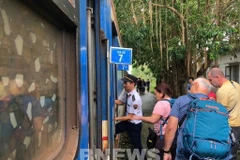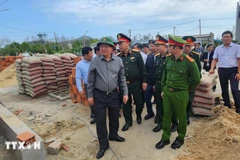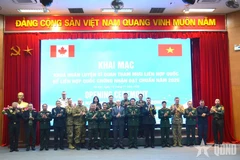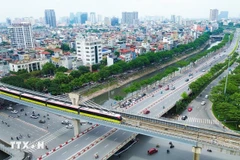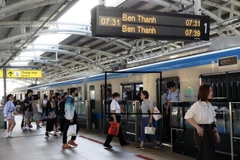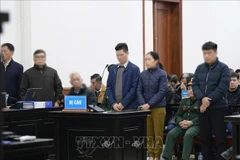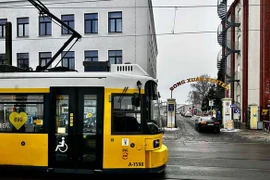 Nguyen Thanh Phong (left), chairman of the HCM City People’s Committee, speaks with Ousmane Dione, country director of the World Bank in Vietnam, during a break at a seminar on Public-Private Partnerships held last week in the city. (Photo: VNA)
Nguyen Thanh Phong (left), chairman of the HCM City People’s Committee, speaks with Ousmane Dione, country director of the World Bank in Vietnam, during a break at a seminar on Public-Private Partnerships held last week in the city. (Photo: VNA) HCM City (VNS/VNA) - Ho Chi Minh City should create favourableconditions and introduce regulations to promote Public Private Partnerships(PPP) in the education sector, which is in need of an international standardlearning environment, experts have recommended.
Speaking at a recent meeting on PPP, Le Hoai Nam, deputy director of the city’sDepartment of Education and Training, said the country’s membership in theWorld Trade Organisation (WTO) had opened up investment opportunities in theprivate sector over the years.
The Government has allowed investors to expand their brand by opening othercampuses in the same city or in other cities.
Nguyen Thanh Phong, chairman of the municipal People’s Committee, said the PPPmodel would be one of the main solutions for capital mobilisation in theeducation sector as city funds were limited.
Currently, nearly all education projects are in the Build-Operate-Transfer(BOT) form.
However, HCM City lacks land-use planning for PPP projects in education,including insufficient information about available land.
A lack of awareness about the role of the private sector in education alsoexists, while the tendency to rely on Government subsidies or grants persists,experts said.
Moreover, investment procedures remain complicated, hindering investmentpromotion activities.
Cao Thanh An, deputy head of the PPP Division under the Department of Planningand Investment, said that profitability was a top priority forinvestors. “Foreign investors or domestic enterprises with less capitalwill prioritise areas that do not require substantial capital or new technology,and which promise a short payback period.”
The initial investment required for the construction of a school is relativelyhigh, and in order to recover the costs quickly, investors usually impose hightuition, which means only better-off families can afford the schools.
The payback period is too long compared to the profit expectations ofbusinesses.
Senior Economist Dilip Parajuli from the World Bank, who is also a senioreconomist for Education Global Practice, said there were risks that investorsneed to be aware of before they invest in the education sector.
There is a delay in acquiring land, which will increase costs and delays inconstruction of schools and educational facilities. And, besides aninterest rate increase, another risk is that the project will not be able togenerate sufficient cashflow to meet its financial obligations, he said.
In addition, the laws or regulations can change in a way that adversely impactsthe project.
Recommendations
According to a report from the Technical World Education Investment andDevelopment Corporation, the Government’s policies to encourage PPP investmentin education would create enabling conditions for investors.
PPP investment would help to develop a healthy and competitive environment forteaching and learning by addressing the latest trends in global education andtraining, according to the report.
Education usually requires long-term investment and low profit margins, whichexplains why businesses often have to offset their operating costs in the firstfew years to maintain the quality of teaching, curriculum and staff members,the report said.
Investors should be able to enjoy investment incentives such as loan interestrates, it recommended.
Most public universities in Vietnam depend on the State budget and tuitionfees, according to the Ministry of Finance. Their income from services,research and technology transfers remains low.
The ministry said the Ministry of Training and Education should work withuniversities to offer suitable tuition range, ensuring benefits for bothuniversities and students.
Students should also receive more financial support under the form of credits,scholarships or assistance.
In addition, the Ministry of Finance has asked public and private universitiesto set up financial plans, seek revenue, and control their spending, instead ofwaiting for funding from the State.
Ousmane Dione, Country Director for the World Bank in Vietnam, said that PPPwould fail if private and public partners did not share both risks andsuccesses.
Dione recommended that legal, regulatory and institutional frameworks remainrobust to enable investors to accept risks over the long term.
“To maintain its economic competitiveness and to meet the challenges stemmingfrom an ageing demographic, the city needs further investment ininfrastructure, especially in areas like transport, health, education and theenvironmental sectors,” he said.
Like most cities across the world, public investment alone will not besufficient to meet the city’s large infrastructure and service deliveryneeds.
Every year, the city government allocates on average about 2.7 trillion VND (116.4million USD) to invest in school facilities. The total number of classrooms inthe city is nearly 45,700, according to the Department of Education andTraining.
For the 2018-19 school year, the city has 2,253 schools, from kindergartens tohigh schools. Among these are 1,321 public schools, accounting for 58.7percent.
Despite decent investments, school facilities still fall short of the actualdevelopment requirements in the sector.
In recent years, the number of students has increased at a rate of about 65,000per year. Having sufficient space to accommodate all students remains a hugechallenge to the education sector.
Every year, the city spends about 26 percent of the total city budget oneducation and training, but that amount has not met the needs of thesector.
The city has approved an investment policy for other 198 projects to ensuresufficient classroom space by 2020, according to the Department of Educationand Training.-VNS/VNA






